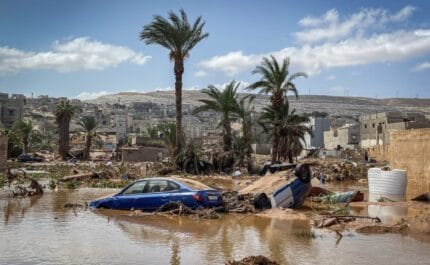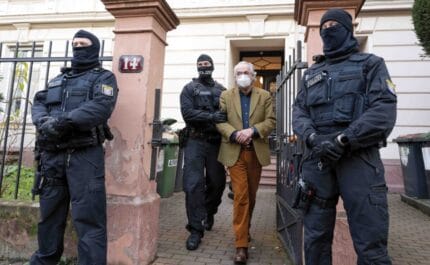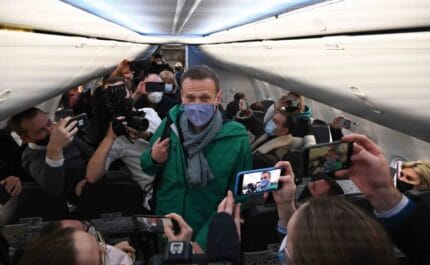Moment that mattered: Belarus forces the landing of a Ryanair flight to detain a journalist
In 2021 we spoke to Jeanne Cavelier from Reporters Without Borders about what the detention of Roman Protasevich means for press freedom

Ryanair Flight FR4978 landing at Vilnius airport after seven hours on the tarmac in Minsk, Belarus, 23rd May (PETRAS MALUKAS/AFP via Getty Images)
23rd May 2021 (Taken from: #43)
At 9.46am on 23rd May, Ryanair Flight FR4978 from Athens to Vilnius made an abrupt change of course. It was about to enter Lithuanian airspace from Belarus when air traffic control ordered the pilots to divert to Minsk. As a Soviet-era MiG-29 fighter jet escorted the plane towards the runway in the Belarusian capital, 26-year-old journalist and dissident Roman Protasevich pleaded with the cabin crew to prevent the landing, saying that the country’s embattled dictator, Alexander Lukashenko, would have him executed. On the tarmac at Minsk airport, Protasevich and his Russian partner, Sofia Sapega, were taken away by security officials.
“My first reaction to the news was ‘It can’t be true, it’s not possible’,” says Jeanne Cavelier, head of the Eastern Europe and Central Asia desk at Paris-based press freedom watchdog Reporters Without Borders (RSF). “It’s totally unprecedented, so I was shocked. But I was not nearly as shocked as the independent journalist community in Belarus and Belarusian journalists abroad because this made them feel terrorised. They didn’t think that such a thing could ever happen, that Lukashenko would go so far as hijacking a plane.”
“My first reaction to the news was ‘It can’t be true, it’s not possible’”
By the time the flight reached its original destination, after a seven-hour grounding during which security staff carried out a futile search for a bomb, further details emerged about the incident. Belarusian air traffic control had told the pilots that they believed there was a bomb aboard the Boeing 737-800 aircraft which would be detonated if it entered Lithuanian airspace, hence the abrupt diversion towards Minsk even though Vilnius was closer at the time of the call.
To ensure the pilots followed the order, a warplane was dispatched. The bomb threat had come from Hamas, the authorities claimed, although a time stamp on the email purportedly sent from the Palestinian militant group suggested it arrived 24 minutes after the call to the pilots. Hamas denies any involvement.
When it became clear that the bomb threat was a ruse, Cavelier and her RSF colleagues in Paris set about punching back at the Lukashenko regime, which has overseen a brutal crackdown on opponents since a disputed election in August 2020 sparked a wave of protests across the country. Two days after the incident, RSF formally asked Lithuania’s prosecutors to investigate Lukashenko for the crime of hijacking an aircraft with terrorist intent.
In November 2020, Protasevich himself had been accused of involvement in terrorist activity, a charge that potentially carries the death penalty, hence his pleading with the Ryanair crew. Until then he had been the editor of the Nexta channel on the encrypted Telegram messaging app, an information-sharing group which gained over two million followers – more than a fifth of Belarus’s population – during the first few months of the mass protests. With the internet largely shut down in Belarus and the news media dominated by regime propaganda, the Poland-based Nexta group, which used user-generated content to help organise demonstrations and flag up allegations of police brutality, has been a critical tool for opposition activists. “Who’s the real terrorist here?” Cavelier says of the charges Protasevich faces. “Is it an opposition journalist who criticised the government… or a head of state who hijacks an airplane to arrest a journalist?”
Four days after the incident Cavelier travelled to Lithuania. Protasevich had moved there in September 2020 to join the leaders of Belarus’s exiled opposition movement. At a protest against the detention of the journalist and his partner, which was being held on the country’s border with Belarus, she spoke to other exiled reporters. “I’ve never seen journalists so shocked,” she says. “Lukashenko’s aim was to terrorise the population in general but in particular critical journalists. His message was ‘You are not safe, even if you are abroad’, and in a way it worked. They were completely devastated. Some of them cried during our meeting; they said ‘I know I’ll never be able to return to Belarus because it’s too dangerous; it’s also very dangerous for our families, and even in Lithuania we can be a target.’”
Cavelier estimates that half of Belarusian journalists are now in exile. They are determined to continue their work, despite the clear risks. “They are afraid, but they don’t want their country to become an information black hole. So they continue to work with sources on the ground,” says Cavelier. Those sources, she says, “endanger their lives” by helping the world to understand what’s going on in Belarus, ranked 158th out of 180 countries on RSF’s annual press freedom index. Around 460 journalists have been arrested since the start of the crackdown, she says, and some of them have been subjected to torture in prison.
There were fears that Protasevich had been tortured when he appeared on Belarusian state TV on 3rd June to ‘confess’ to organising illegal protests, and bruises could be seen on his wrists. In this interview, which opposition groups insist took place under duress, Protasevich made flattering comments about a leader he had previously compared to Adolf Hitler. “He said Lukashenko had balls of steel!” says Cavelier. “Can you imagine a journalist saying such a thing? This practice [of televised forced confessions] is meant to be humiliating. Of course we cannot believe such a masquerade.” In a separate video, also apparently made under duress, Sofia Sapega ‘confessed’ to editing a Telegram channel which published the personal data of regime officials. Sapega’s mother insists that her daughter, a law student in Vilnius, isn’t political and was simply in the “wrong place at the wrong time”.
The international community reacted to the incident with outrage. Polish prime minister Mateusz Morawiecki accused Lukashenko of a “reprehensible act of state terrorism” while then-UK foreign secretary Dominic Raab said the hijacking would have “serious implications” for Lukashenko. The US, the EU, the UK and Canada all introduced new sanctions against entities and individuals in Belarus, while the EU banned Belarusian carriers from flying over its airspace. However, in August the regime received assets worth around $900 million from the International Monetary Fund (IMF) intended for Covid-19 relief. Cavelier calls the payment “shameful”. “Even if the money is aimed to fight the coronavirus pandemic, we know it will help the police forces to continue their harassment and violence against protesters and journalists on the front line,” she says. The IMF, which sent special drawing rights (an international reserve asset that can be exchanged for hard currency) to all 190 member states, says it continues to keep a close watch on Belarus.
On 14th June, the Belarusian authorities held another news conference at which Protasevich told reporters that he was happy and in good health. Almost certainly speaking under duress, he ‘apologised’ for having hurt the nation. On 25th June, the Belarusian authorities, who continue to insist the Hamas bomb threat wasn’t staged, say that Protasevich and Sapega have been moved from a KGB prison to house arrest.
In the months since the incident, the Lukashenko regime has intensified its efforts to intimidate opponents based abroad, as highlighted by two separate incidents in the first week of August. In the Ukrainian capital, Kiev, Vitaly Shishov, who ran a group helping Belarusians flee their country, was found hanged from a tree in a park. His supporters insist it was not a suicide. And at the Tokyo Olympics, sprinter Krystsina Tsimanouskaya alleged that the Belarusian authorities tried to force her out of Japan against her will after she criticised team coaches. She told a police officer at Haneda airport that she needed political asylum, and was later given a humanitarian visa by Poland.
“The free press is crucial to democracy and that’s why Lukashenko’s biggest enemies are journalists”
Lukashenko hopes that the forced grounding of the Ryanair flight and the subsequent attacks on Belarusian opponents abroad will project the strength of the regime. But Cavelier sees them as signs of the president’s escalating fear that he will be toppled. “He doesn’t feel safe and that’s why he’s gone so far with the crackdown,” she says. “His people are fed up with him and his mismanagement of the country. For example, he did nothing for his people to fight the pandemic” [which he dismissed as a ‘mass psychosis’ that could be remedied with some vodka and a sauna].“The free press is crucial to democracy and that’s why his biggest enemies are journalists,” Cavelier adds. “That’s why the Belarus police hunt them. When people are informed, when there is press pluralism, people can form their own opinions. And that’s a big problem for Lukashenko.”
Slow Journalism in your inbox, plus infographics, offers and more: sign up for the free DG newsletter. Sign me up
Thanks for signing up.








